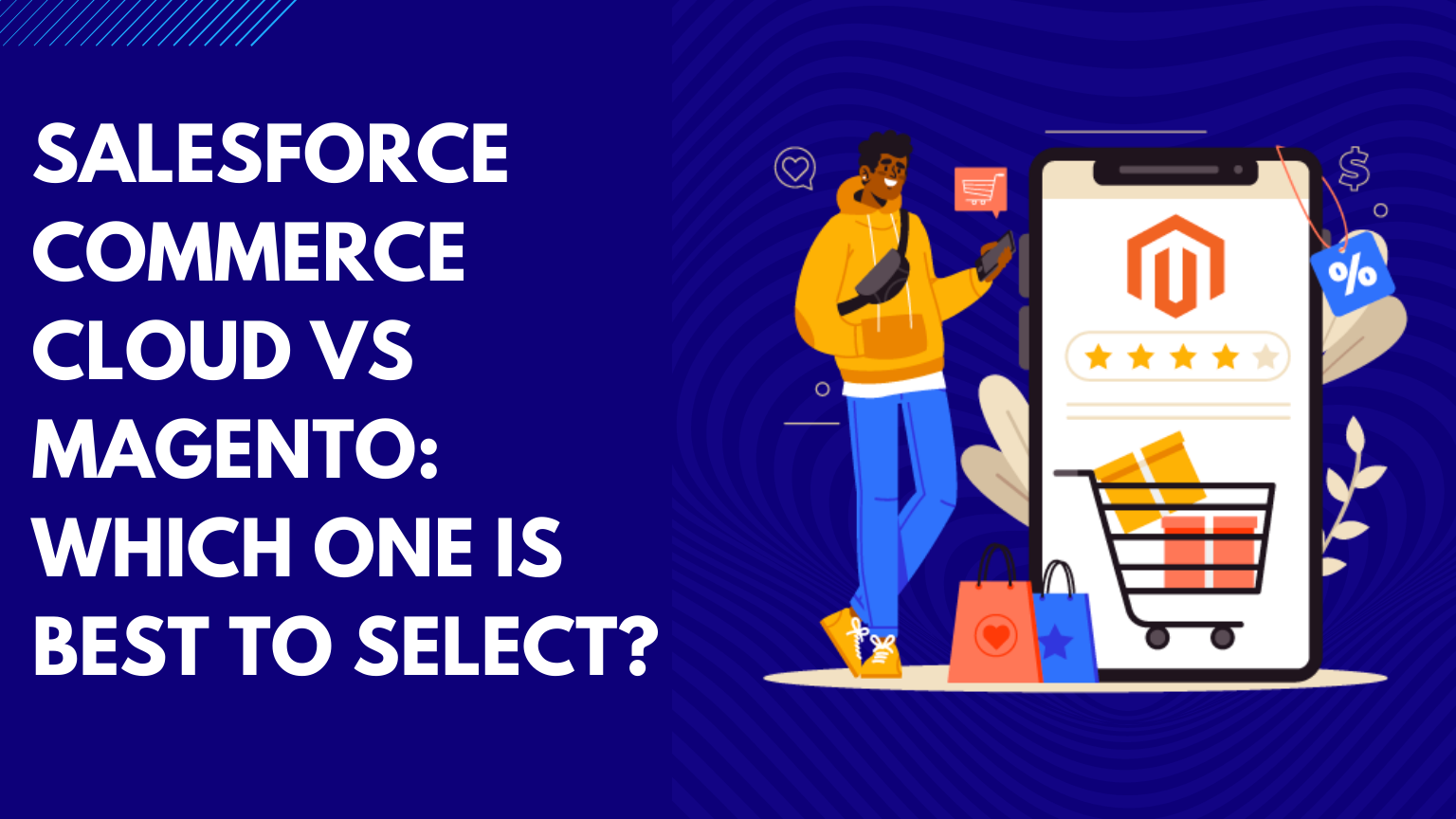Salesforce Commerce Cloud Vs Magento: Which One Is Best To Select?

Whenever it comes to Ecommerce Magento Vs Salesforce is something nearly impossible to overlook. It is a hotly debated subject that has caused a breach between developers, merchants, and the official communities of Magento & Salesforce.
Both Ecommerce systems are among the most highly sought-after cloud-based Ecommerce platforms available, with comprehensive and cutting-edge capabilities. Magento is a widely used Ecommerce platform being used by business owners for years now; on the other hand, Salesforce is a more innovative and recently proposed alternative. It provides merchants and users with a highly optimized Ecommerce experience that is second to none. Now, without wasting any time, let’s discuss and understand which one has the upper hand when it comes to Ecommerce.
What is Salesforce Commerce Cloud?
Salesforce Commerce Cloud was previously known as Demandware, but it was bought by Salesforce in 2016 and rebranded as Salesforce Commerce Cloud. Also, Salesforce Commerce Cloud is built on Java, and its source code is not available to third-party developers or organizations. Instead, the program code is only accessible through the platform’s REST API and the platform’s own Pipelet system, which implies that additional functionality cannot be introduced directly to the Java source code of the application.
Who is Using The Salesforce Commerce Cloud?
B2C Commerce and B2B Commerce are the two commerce products available for consumers, brands and retailers. Both B2C and B2B organizations want to provide their clients with an outstanding Ecommerce experience through eCommerce websites; therefore, they must employ various practical solutions to achieve this goal. B2C Commerce is often used to manage Ecommerce websites with a significant number of guest shoppers and improve the buying experience for the customers who visit the site.
Salesforce B2B Commerce, on the other hand, is designed to meet the requirements of B2B buyers who make substantial purchases and give them premium experiences. Cloud Commerce satisfies the needs of both B2C and B2B businesses. Customer service, fulfillment, and artificial intelligence are just a few of its services, including marketing, merchandising, content, promotions, and customer support.
What is Magento?
Magento is a content management system (CMS) for Ecommerce businesses (CMS). Also, it offers company owners the technology they require to operate an online store or marketplace successfully. As a website administrator, it is your responsibility to manage your product catalog, design, and change landing pages, and employ Ecommerce-specific marketing tools to achieve a competitive advantage in your industry.
One of the most critical factors contributing to Magento’s high popularity compared to specific other Ecommerce solutions available on the market is that Magento provides merchants with total freedom and control over the functioning of their online channels and channels. To do this, Magento delivers a comprehensive list of essential features that provide shop owners with the flexibility to design and configure their online businesses to meet their specific company requirements best while maximizing advantages.
Salesforce Commerce Cloud Vs Magento
Even though Salesforce and Magento are both well recognized for their comprehensive functions, which help online merchants in efficiently setting up Ecommerce businesses, there are some significant distinctions between the two platforms.
1. Internationalization
The internationalization capabilities of Salesforce Commerce Cloud and Magento Commerce are nearly identical, as both systems aim to serve merchants that generate a significant amount of revenue internationally.
A site built on Salesforce Commerce Cloud may be customized and modified to meet the diverse demands of customers from a variety of different geographic locations. It contains a range of localization capabilities to assist in the worldwide expansion of a company’s products and services. From the storefront to the Business Manager, you have the option to localize your store design.
Magento Commerce can support many languages, many currencies, and localized pricing and tax rates, among other features. Using a single shop, you may administer various sites in various nations simultaneously. You can also define a list of countries authorized for site registration, shipping, and paying.
2. Content Management
A page builder is a user-friendly drag-and-drop tool for generating and altering content management system (CMS) pages, static and dynamic blocks, and other elements. In addition to configuring the appearance of inert components, this capability allows you to modify the behavior of active page elements. Earlier this year, Magento natively incorporated the Page Builder, resulting in an immediate improvement in the platform’s content management skills.
Whenever consumers enter your digital domains, the material they see has to be tailored and customer-centric. Every piece of information must address client frustrations, wants, queries, and desires. Instead of developing content blindly, teams may begin the content development process guided by client data.
Plus, Salesforce CMS enables you to transform your insights into content. Imagine taking a CRM record and turning the columns and rows into rich, graphical content – like a banner, tile navigation, or an appealing advertising CTA.
3. SaaS Platform
Salesforce Commerce Cloud is delivered as a Software as a Service (SaaS) platform, which is critical in developing cloud computing solutions. It provides continuous access to factual information for your online and offline activities. As a result, the sales management process is highly effective and efficient. Therefore, the Salesforce Commerce Cloud is a superior choice over Magento, which is a Platform as a Service (Platform) (PaaS).
Conclusion
Developing great customer relationships will allow you to up your company’s game faster. Salesforce Commerce Cloud is beneficial in this situation. Using Salesforce would also be helpful if your company generates regular revenue. In other words, if you answered “yes” to all of the above questions, you are good to go.


